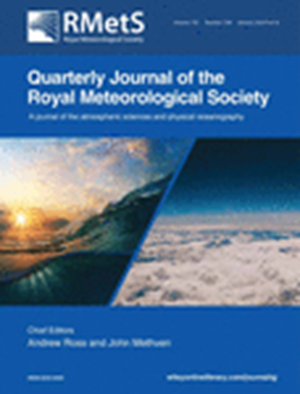通过方差分析优化模拟印度夏季季风降雨的 CMIP6 模型
IF 2.9
3区 地球科学
Q2 METEOROLOGY & ATMOSPHERIC SCIENCES
引用次数: 0
摘要
天气和气候模式的出现使我们有能力预测或预报不同时空尺度的季风降雨模式;但是,由于单个模式本身存在不确定性,利用单个模式通常不足以做出准确的预测。为了更好地进行预测,通常会使用多模型集合(MME)来集合模型或模型运行。本研究利用耦合模式相互比较项目第 6 阶段(CMIP6)模拟分析了多模式集合在模拟印度夏季季风降雨量(ISMR)变化方面的准确性。研究结果表明,虽然 MME 主要再现了观测到的降雨模式和年降雨周期,但在除印度东北部以外的印度同质气象区域存在明显偏差。为了解决这个问题,我们采用了方差分析(ANOVA)和事后统计检验来确定一组模型,对这些模型而言,修正后的 MME 能更好地估计降雨量并显著减少偏差。我们的研究结果表明,方差分析和事后统计检验是提高多模式集合降雨量准确性的一种实用方法,可用于模式预测评估。本文章由计算机程序翻译,如有差异,请以英文原文为准。
Optimization of CMIP6 models for simulation of summer monsoon rainfall over India by analysis of variance
The advent of weather and climate models has equipped us to forecast or project monsoon rainfall patterns over various spatiotemporal scales; however, utilizing a single model is not usually sufficient to yield accurate projection due to the inherent uncertainties associated with the individual models. An ensemble of models or model runs is often used for better projections as a multimodel ensemble (MME). This study analyzes the accuracy of MME in simulating the Indian summer monsoon rainfall (ISMR) variability using Coupled Model Intercomparison Project Phase 6 (CMIP6) simulations. The results highlighted that although the MME primarily reproduces the observed pattern and annual cycle of rainfall, significant biases are noted over homogeneous meteorological regions of India, except northeast India. To overcome this issue, an analysis of variance (ANOVA) and post hoc statistical tests are employed to identify a group of models for which the modified MME gives a better estimate of rainfall and reduces the bias significantly. Our findings underscore the potential of ANOVA and post hoc tests as a practical approach to enhancing the accuracy of multimodel ensemble rainfall for the assessment of model projections.
求助全文
通过发布文献求助,成功后即可免费获取论文全文。
去求助
来源期刊
CiteScore
16.80
自引率
4.50%
发文量
163
审稿时长
3-8 weeks
期刊介绍:
The Quarterly Journal of the Royal Meteorological Society is a journal published by the Royal Meteorological Society. It aims to communicate and document new research in the atmospheric sciences and related fields. The journal is considered one of the leading publications in meteorology worldwide. It accepts articles, comprehensive review articles, and comments on published papers. It is published eight times a year, with additional special issues.
The Quarterly Journal has a wide readership of scientists in the atmospheric and related fields. It is indexed and abstracted in various databases, including Advanced Polymers Abstracts, Agricultural Engineering Abstracts, CAB Abstracts, CABDirect, COMPENDEX, CSA Civil Engineering Abstracts, Earthquake Engineering Abstracts, Engineered Materials Abstracts, Science Citation Index, SCOPUS, Web of Science, and more.

 求助内容:
求助内容: 应助结果提醒方式:
应助结果提醒方式:


